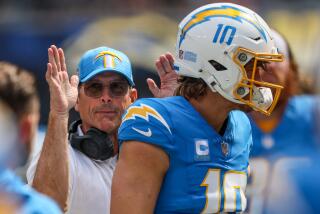Giants Come Up With Lou Gehrig as the Tight End
- Share via
Remember the old schoolyard games of football we used to play? The guy who owned the football would say: “OK, I’ll be the quarterback. You guys all go out for a long one.”
Then, he’d turn to the big, silent kid, the one whose clothes always seemed a size too small, whose speech was slow and so was he and who always seemed to hate to be noticed, and he’d tell him, “You stay here and block.”
Anybody else on the team would squawk to high heaven--”I never get the ball!”--but this guy would do what he was told without a word of complaint.
That guy, in football today, is called the tight end. It’s not a position, it’s a penance. It’s the football equivalent of being a guard at the gang hide-out or riding shotgun on a stagecoach.
It’s not as anonymous as offensive lineman but it’s worse in some respects. It’s instant schizophrenia. On the one hand, you’re supposed to be a nifty receiver with all the moves. On the other hand, you’re supposed to be a bone-crushing blocker who has to pile up blitzing linebackers or stunting tackles before you ever get a chance at a pass route.
You get the football only when the quarterback is under a desperate rush or all his receivers are covered. You usually have to catch it in a crowd, over the middle and under a swarm of pesky safetymen or homicidal cornerbacks who try to strip you of the ball, your arm, your head, whichever comes easiest.
You’re outweighed by the men you have to block and you’re outrun by the men you have to catch the ball against.
Mark Bavaro of the New York Giants is your prototypal tight end. You couldn’t build one more to specifications if you had a letter from God.
He’s just faster than a statue but twice as strong. He’s just smaller than a moose but twice as smart. He’s as self-effacing as a spy. And as disciplined as a German general.
He’s what makes the New York Giants a legitimate Super Bowl contender this year. The Giants don’t scare you with their downfield speed or their offensive dazzle. The Giants play arm-wrestle football. They make you say uncle.
When their so-so receivers are covered, they go to Bavaro. He’s always there. If the ball comes within two yards of him, he catches it. He caught 37 passes for 4 touchdowns last season as a rookie. He caught 9 more in the playoffs, including a one-handed grab that beat the 49ers in San Francisco.
At Notre Dame, a school that invented it, he was noted for his intensity.
“To say that Bavaro blocks you is like saying a train blocked a car it plowed into at an intersection,” the coach once explained.
He’s in the Lou Gehrig mold. In fact, he got his job the same way Gehrig did. Gehrig made Wally Pipp a trivia question when he replaced him at first base one day when Pipp was feeling indisposed and Gehrig went on to play 2,130 consecutive games. When Wally Pipp died in 1965, 725 guys wrote Lou Gehrig columns.
When Mark Bavaro reported to camp last year, the first-string tight end was Zeke Mowatt. He hurt his knee in the final exhibition game. Bavaro went in for him and is working on his own consecutive-games record.
He is so loath to come out of the lineup that the Giants noticed him coming to practice one day walking as if he were crossing a bed of glowing coals. Investigation showed that Bavaro had cultivated severe blisters on the soles of his feet but, rather than notify the team, had taken to scraping them off himself with a razor.
“A couple more cuts and he would have been walking on his ankles,” said Ed Croke, the team publicist.
Bavaro, who is 6-4 and 240, destroyed the Raiders Sunday with 6 catches for 106 yards. He kept the Giants in the ballgame at times when to turn the ball over would have meant the Raiders could put it out of sight. His 17-yard reception on the first touchdown drive--the Giants won, 14-9--was pivotal. His blocking was apocalyptic.
In the locker room later, he managed to look like a guy trying to escape a posse. A reporter approached him as he peeled off a T-shirt.
“Are you Mark Bavaro?” he wanted to know.
“No,” Mark Bavaro said.
He later relented, then answered questions with all the enthusiasm of a suspect in a kidnaping.
Was tight end an important position at Notre Dame?
“Well, they had Dave Casper and Leon Hart and Tony Hunter. . . . “
Did a lot of schools try to recruit him in high school?
“I don’t remember. I wanted to go to Notre Dame, anyway. It didn’t matter.”
Wasn’t he a trackman in high school?
“Yes, I was a shotputter and a hurdler.”
What was his time in the hurdles?
“I don’t remember.”
More to Read
Go beyond the scoreboard
Get the latest on L.A.'s teams in the daily Sports Report newsletter.
You may occasionally receive promotional content from the Los Angeles Times.










